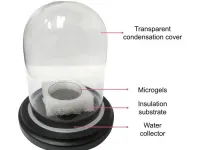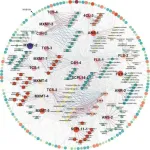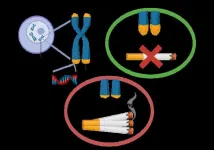(Press-News.org) Shorter telomeres on the ends of white blood cell chromosomes may signal a heightened dementia risk, suggest the results of a large long term study, published online in the journal General Psychiatry.
They are associated with smaller total and white matter brain volume, which helps the body process information, and may be a predictor of future brain health, say the researchers.
A telomere–the equivalent of a shoelace cap—is intended to prevent the loss of coded DNA by a chromosome fraying or unravelling when it replicates.
Each time a cell divides, chromosomes replicate, and telomeres shorten slightly, so telomeres have emerged as a promising marker for cellular ageing and the risk of age-related diseases, note the researchers. But studies looking at telomere length and brain health are few and far between.
To explore this further, they drew on data from the UK Biobank to look at potential associations between the telomere length of leucocytes (white blood cells) and the risk of dementia, including Alzheimer’s disease and vascular dementia, and total and regional brain volumes.
The UK Biobank is a large biomedical database containing in-depth genetic and health information for around half a million people in the UK who were enrolled between 2006 and 2010.
Leucocyte telomere length was measured by analysing blood samples taken at enrolment. These data were available for 439, 961 people aged 37 to 73 at the time (average age 56).
During an average monitoring period of nearly 12 years, 1551 (0.4%) participants were diagnosed with Alzheimer’s disease; 767 (0.2%) with vascular dementia;and 5820 (1.3%) with other type of dementia.
Analysis of the data revealed a significant association between leucocyte telomere length and subsequent risk of dementia.
After accounting for sex and age, participants with the shortest leucocyte telomeres were 14% more likely to be diagnosed with dementia and 28% more likely to be diagnosed with Alzheimer’s disease than those with the longest leucocyte telomeres.
The risk of vascular dementia was also increased (18%), although this wasn’t statistically significant.
Brain structure was visualised on MRI full body scans for 38,740 participants in 2014. This revealed a linear association between shorter leucocyte telomeres and smaller total brain volume, white matter, as well as brain structures including the hippocampus (involved in learning and memory), the thalamus (sensory processing centre), and the nucleus accumbens (the ‘pleasure centre’).
This is an observational study, and as such, can’t establish cause. The researchers also highlight several limitations: telomere length was measured only once so it was impossible to find out whether changes over time might have affected the chances of dementia, added to which telomere length was measured only in leucocytes.
Measurement of telomere length in glial cells (non-neuronal cells in the central nervous system) might have been even more informative, they suggest, but these data weren’t available from the UK Biobank.
And dementia diagnoses were obtained only from electronic health records, which may not have been up to date and may not have mentioned milder forms.
Nevertheless, the researchers conclude, “We found that leucocyte telomere length acts as an aging biomarker associated with the risk of dementia. Furthermore, we also observed linear associations of leucocyte telomere length with total and regional brain structure.
“These findings highlight telomere length as a potential biomarker of brain health.”
END
Shorter white blood cell telomeres linked to higher dementia risk
Associated with smaller total and white matter brain volume; may be predictor of brain health
2023-09-12
ELSE PRESS RELEASES FROM THIS DATE:
Around 1 in 3 UK medical students plans to leave NHS within 2 years of graduation
2023-09-12
Around 1 in 3 UK medical students plans to leave the NHS within 2 years of graduating—either to practise abroad or to abandon medicine altogether—suggest the results of the largest survey of its kind, published in the open access journal BMJ Open.
Pay, work-life balance, and working conditions are the key drivers behind the decisions to leave, the responses indicate.
The UK has 3.2 doctors for every 1000 people, ranking 25th among the Organisation for Economic Co-operation and Development (OECD) countries. This figure also represents the lowest number of doctors per head among European ...
Work stress, workload, understaffing driving out health professionals from NHS
2023-09-12
Work stress, high workload, and understaffing are the primary factors driving health professionals out of the NHS, suggest the results of a survey published in the open access journal BMJ Open.
The findings prompt the researchers to suggest that pay increases alone may not be sufficient to fix NHS staff retention.
There are well over 100,000 staff vacancies in the NHS. And worsening retention of NHS health professionals has been attributed to the fall-out from the COVID-19 pandemic.
To explore this further, the researchers wanted to assess the relative ...
Hot summer air turns into drinking water with new gel device
2023-09-12
For significant portions of the globe faced with water shortage problems, a beacon of hope may be on the way: the ability to easily turn hot air into drinking water.
For the past few years, researchers at The University of Texas at Austin have focused on the moisture present in the air as a potential source of drinking water for drought-stressed populations. In new research published in the Proceedings of the National Academy of Sciences, they reached a significant breakthrough in their efforts to ...
Young people who vape more likely to report chronic stress
2023-09-12
Milan, Italy: Young people who have used e-cigarettes are more than twice as likely to report experiencing chronic stress, according to research presented at the European Respiratory Society International Congress in Milan, Italy [1].
The study was presented by Dr Teresa To, a senior scientist at The Hospital for Sick Children (SickKids) in Toronto, Canada. She said: “Research is starting to show how vaping affects young people’s physical and mental health. For example, our previous research has shown that those who vape are more likely to suffer an asthma attack. In this study we were particularly interested in the relationship between vaping, ...
Novel study reveals the accumulation mechanisms of purine alkaloids and catechins in theobromine-rich tea
2023-09-12
Camellia ptilophylla, a low-caffeine or decaffeinated tea, is increasingly being recognized for its potential health benefits. However, there is intraspecific diversity in purine alkaloid and catechins components in C. ptilophylla populations. Analyzing the mechanisms behind the accumulation of these metabolites is important for improving tea quality.
Beverage Plant Research published online a paper by Associate Professor Binmei Sun and Shaoqun Liu’s team at South China Agricultural University entitled “Differential accumulation mechanisms of purine alkaloids and catechins in Camellia ptilophylla, a natural theobromine-rich ...
Transplanting patients’ own lung cells offers hope of ‘cure’ for COPD
2023-09-12
Milan, Italy: For the first time, researchers have shown it is possible to repair damaged lung tissue in patients with chronic obstructive pulmonary disease (COPD) using the patients’ own lung cells.
The European Respiratory Society International Congress in Milan, Italy [1], heard that 17 patients who took part in a phase I clinical trial were able to breath better, walk further and had better quality of life after receiving the experimental treatment.
COPD kills approximately three million people worldwide every year. It is a severe respiratory disease that involves progressive damage to lung tissue. The affected tissue cannot be repaired ...
Genetic evidence shows that smoking can cause us to age faster
2023-09-12
Milan, Italy: A study of nearly 500,000 people has shown that smoking shortens the end fragments of chromosomes in the white blood cells of our immune systems. The length of these end fragments, called telomeres, is an indicator of how quickly we age and our cells’ ability to repair and regenerate.
In her presentation to the European Respiratory Society International Congress in Milan, Italy [1], Dr Siyu Dai, who is an assistant professor in the School of Clinical Medicine, Hangzhou Normal University, and also an honorary postdoctoral researcher in the department of paediatrics, The Chinese University of Hong Kong, said: “Our study shows that smoking status and ...
Alive without a pulse: Evolution of durable left ventricular assist devices
2023-09-11
https://www.scienceopen.com/hosted-document?doi=10.15212/CVIA.2023.0056
Announcing a new article publication for Cardiovascular Innovations and Applications journal. Durable left ventricular assist devices (LVADs) offer a viable option for patients with advanced heart failure and have been demonstrated to be superior to optimal medical therapy in terms of both mortality and quality of life, in selected patients. However, durable LVADs can be associated with severe morbidity. Because the rates of cardiac ...
Doctoral student’s "fear of positivity" research could assist with effective depression treatments
2023-09-11
STARKVILLE, Miss.—How can positive experiences seem like the opposite for some?
A doctoral student in Mississippi State University’s Clinical Psychology program believes this phenomenon is true, and his recent research is featured in an upcoming issue of The Journal of Behavioral Therapy and Experimental Psychiatry.
Michael R. Gallagher’s article “A network analytic investigation of avoidance, dampening, and devaluation of positivity” focuses on how behaviors related to processing positive experiences may play a role ...
Stem cell-derived components may treat underlying causes of PCOS
2023-09-11
Polycystic ovary syndrome (PCOS) is a pervasive endocrine disorder that affects millions of women globally, impacting their hormonal balance, fertility and overall well-being. It is notoriously difficult to treat, with widely varying symptoms and mysterious, complex underlying causes. Researchers at the University of Chicago recently unveiled a potential new PCOS treatment that may improve multiple PCOS symptoms by regulating body systems and reducing inflammation.
Recently published results demonstrate the promise ...
LAST 30 PRESS RELEASES:
For solar power to truly provide affordable energy access, we need to deploy it better
Middle-aged men are most vulnerable to faster aging due to ‘forever chemicals’
Starving cancer: Nutrient deprivation effects on synovial sarcoma
Speaking from the heart: Study identifies key concerns of parenting with an early-onset cardiovascular condition
From the Late Bronze Age to today - Old Irish Goat carries 3,000 years of Irish history
Emerging class of antibiotics to tackle global tuberculosis crisis
Researchers create distortion-resistant energy materials to improve lithium-ion batteries
Scientists create the most detailed molecular map to date of the developing Down syndrome brain
Nutrient uptake gets to the root of roots
Aspirin not a quick fix for preventing bowel cancer
HPV vaccination provides “sustained protection” against cervical cancer
Many post-authorization studies fail to comply with public disclosure rules
GLP-1 drugs combined with healthy lifestyle habits linked with reduced cardiovascular risk among diabetes patients
Solved: New analysis of Apollo Moon samples finally settles debate about lunar magnetic field
University of Birmingham to host national computing center
Play nicely: Children who are not friends connect better through play when given a goal
Surviving the extreme temperatures of the climate crisis calls for a revolution in home and building design
The wild can be ‘death trap’ for rescued animals
New research: Nighttime road traffic noise stresses the heart and blood vessels
Meningococcal B vaccination does not reduce gonorrhoea, trial results show
AAO-HNSF awarded grant to advance age-friendly care in otolaryngology through national initiative
Eight years running: Newsweek names Mayo Clinic ‘World’s Best Hospital’
Coffee waste turned into clean air solution: researchers develop sustainable catalyst to remove toxic hydrogen sulfide
Scientists uncover how engineered biochar and microbes work together to boost plant-based cleanup of cadmium-polluted soils
Engineered biochar could unlock more effective and scalable solutions for soil and water pollution
Differing immune responses in infants may explain increased severity of RSV over SARS-CoV-2
The invisible hand of climate change: How extreme heat dictates who is born
Surprising culprit leads to chronic rejection of transplanted lungs, hearts
Study explains how ketogenic diets prevent seizures
New approach to qualifying nuclear reactor components rolling out this year
[Press-News.org] Shorter white blood cell telomeres linked to higher dementia riskAssociated with smaller total and white matter brain volume; may be predictor of brain health




